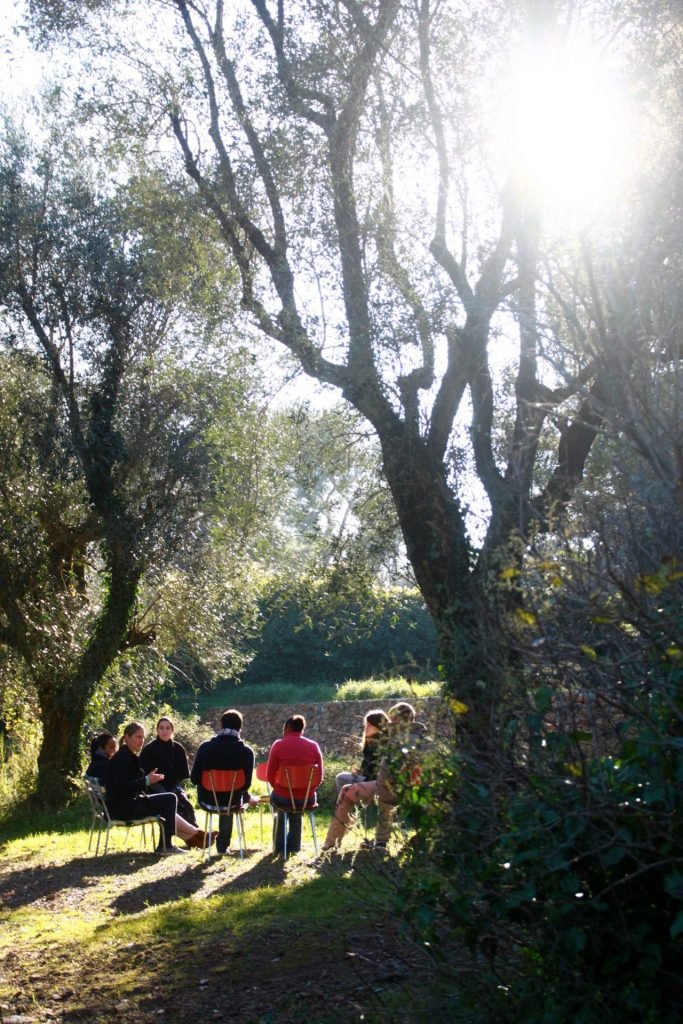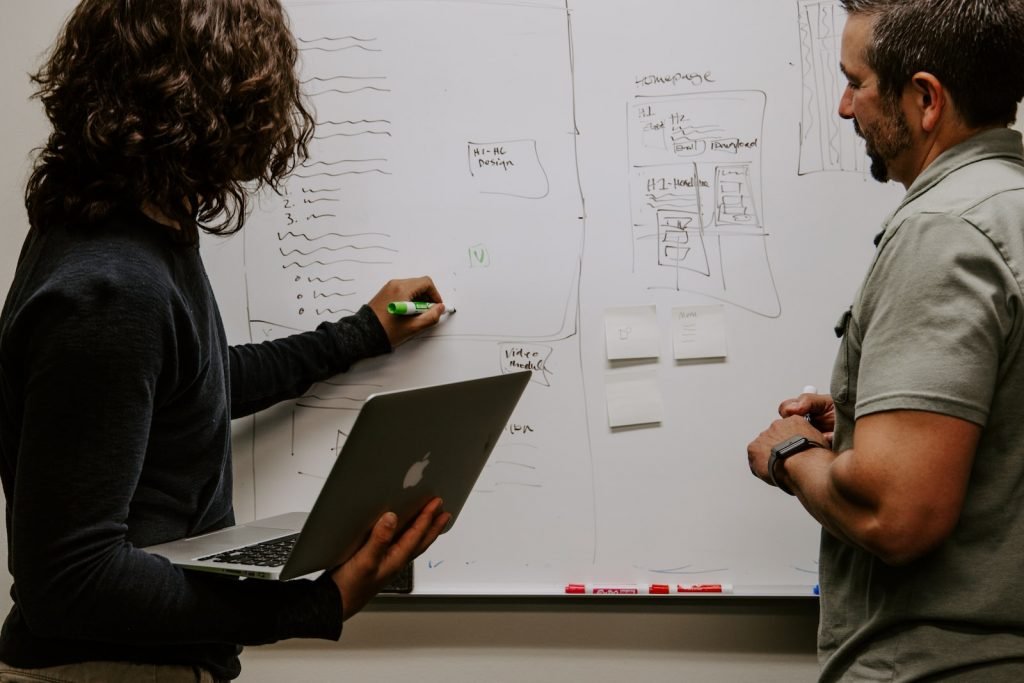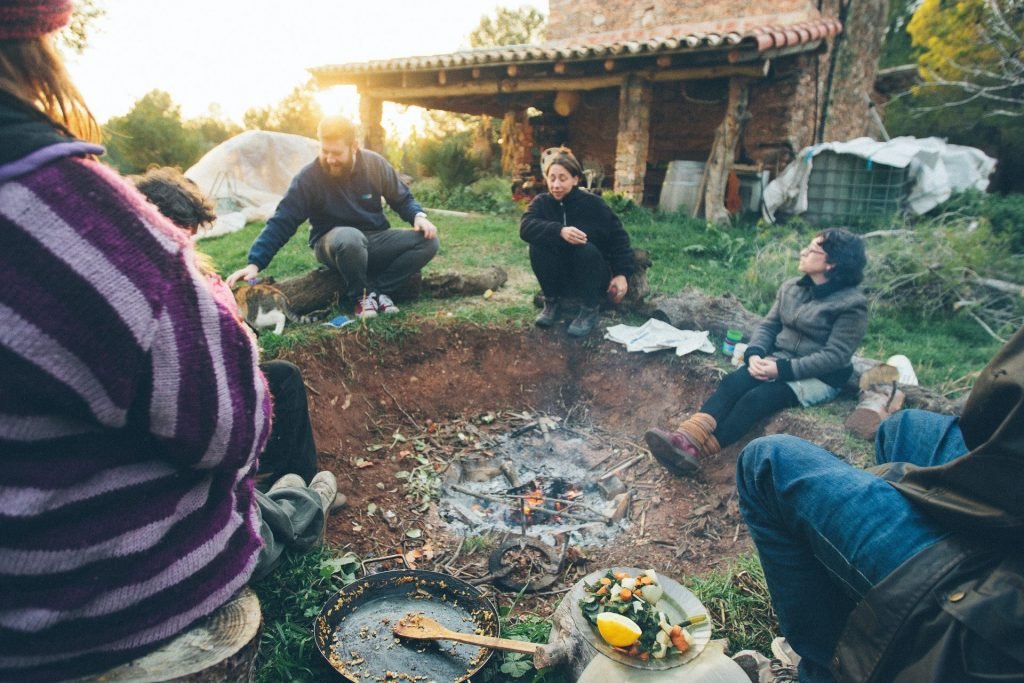These guidelines for intentional community agreements are to help groups in the forming phase especially. Writing your agreements can help your founding members get on the same page. It also can help potential new members to understand whether your vision and decisions will be workable for them. If they are going to join in and make substantial contributions, they will want to either help make the decisions or know about the decisions that have already been made. The agreement guidelines and templates have been refined by qualified consultants. They’re mouldable into whatever a group of founders feel like is, for them, “good enuf for now, safe enuf to try.”

Written Agreements Help Clarify Expectations
These ICmatch guidelines prompt you to discuss important issues before they become problematic. You may feel confident that everyone’s good intentions will lead you all to find a way to meets everyone’s needs or compromise, anytime you have a disagreement. We have learned this is overly optimistic. There are undoubtedly groups who have transcended the need for written agreements and are self-accountable, but the rest of us have to evolve from where we are.
These discussion prompts are to help you all compromise less by finding a good fit from the start. There are many groups of idealistic and motivated communitarians who discover only after substantial investment that their fervent ideals are not in as much alignment with each other as they had assumed. From reading about many founders’ successes and failures, we’ve learned that tackling some of these challenging issues from the start can help groups base their residential community formation on a more realistic understanding. It’s like a prenup: It seems to lessen some of the romance, but it can lessen a whole lot of uncertainty when unexpected or challenging situations arise. The lists within the linked guides and templates are meant to tip you off to various alternatives you may not have considered.
the need for written agreements: describes several crucial benefits that written agreements provide over verbal or implied agreements
the limits of written agreements: two group facilitators with decades of experience living in intentional community speak to why we resist making explicit agreements or contracts
IRESOI Institute: With the experience of 10 years as a manager at an intentional community of around 50 members, one researcher describes the need for rules, along with the impact of our attitude toward each other, respect and curiosity for perspectives we disagree with, patience, and trust in collective work that invites everyone’s participation.
Templates for Your Written Agreement
In each main section of the pages linked below, there is a link to where the guidance or tips are found (from the sections in this page). The list of headings is pared down to allow you to easily scan to see what you haven’t yet filled in. The sections below have descriptions and prompts to help you consider a variety of options. You can cut and paste these options into your Google doc or other word processing app. The Microsoft Word document has the advantage of headings already formatted to match a table of contents.
Googledocs version of Agreements Template
Microsoft Word version of Agreements Template (look for download, not new browser page)
Examples of Agreements From Existing Communities
We recognize that each group will need something slightly different depending on the size, purpose, planned duration, and composition of their community. For groups that are at a phase in which they are planning legal founding documents, a much longer and more detailed set of agreements will be needed. We recommend taking a look at the documents of long standing communities of a type that matches some aspects of your community, such as the following:
- Dual-tenant house share: an e-book for setting up dual-household rental agreements by Co-abode
- Rent-sharing multi-tenant house: coliving housemate rules refined over two decades
- Multi-house collective: shared resources include a school, food, gardens, with half-siblings whose parents are in different households
- Income sharing commune: detailed legal documents detailing the decisions and agreements governing Twin Oaks income-sharing IC
- Federation of Egalitarian Communities: collection of articles of incorporation
The topics below for intentional community agreements cover the general topics in the profile questions. See the Examples and Resources sections within the Community Types pages for other examples of community agreements that relate to the type of community closest to yours. There you may find additional helpful resources specific to various community types.
Suggested General Strategy for Written Agreements
- ICmatch is designed to help your group find each other and gel faster than it would happen otherwise. It still won’t be as fast as you want it to be. You’ll have to make a call about starting your meetings with five matching members, or waiting until you have more so that you’ll still have 5 if a few drop out. If you haven’t been interacting much, it might be better to wait until you have at least 10 potential members. That way, there’s more chance that some will find strong compatibility. You may end up with two separate groups that can remain supportive while operating separatly.
- While there’s a lot we know about group formation, every group is going to be unique. If you choose to share your journey with us, it might help other groups learn what works and what to avoid.
- Keep in mind that you may want to add in more members over time. If there are options that everyone in your founders group is okay with, leave them for a later decision instead of deleting the options.
- Share with each other your “deal breakers” sections in case some haven’t read that section of others’ profiles. If you still feel like there’s enuf compatibility, at least you’ll be aware of some challenges to come. You may want to have an initial meeting to talk about the issues that are most likely to be a point of disagreement. This will help you see if you can get some potential compromises or win-win solutions worked out. This may fragment the group a bit, as some may be compatible with the coordinator but not with each other. Better to know this early on, even tho it can feel disappointing. It will help you spend your time getting to know people who are more likely a good fit.
- If you start with the visioning process, which is described as part of creating the vision statement, this sets a good foundation for those who have compatible vision. If one or more of the members has a different vision, it’s best for them to recognize that before spending too much time with the group.
- Check out our page linked below on roles for founder’s group members. Once you have these roles taken on by your group members, the member whose role is closely involved with the topics covered in the sections below can lead the team in that discussion.
- In as much detail as you have agreed on, write up the preferences of your group regarding the various topics. This will help you communicate with others whether they’re likely a fit or not.
- As your founders team gets more clear on your agreements, the ICmatch member who is the group coordinator (and others if they choose to) could adjust their personal profile responses to match the group agreements. This will also save the members and especially the coordinator time, because the leadership team won’t be matching up with and reviewing profiles of people who aren’t a good fit with the group decisions. People who are a good match will inquire about joining your group, while others will be able to determine whether they’re a good fit, with little or no need to correspond.
Roles for founder’s group members
Guide to number of members in your founder’s group
Vision and Mission
There may be people who are a decent cultural fit with your group even if they don’t agree on every point. As long as they are okay with the current direction and will stick to the rules, compliance might be enuf for your group to function. However, this is a risky path forward. Often a group of idealists imagines that their group’s values are held equally by all members. Idealists are often confident that everything can be worked out as they go along, given their strong commitment to the idea of community and diversity. After much investment of time and resources, some groups find that their individual ideals are not as much in alignment as they had first thought. Are there core values that each member needs to be committed to in order for the IC purpose to be met? Can each member agree on a vision of what success looks like, and a mission statement? The following linked pages can help you sort this out. Try not to think of it as failure if your group doesn’t cohere. It can be a step forward if you recognize core differences, even if it seems like a step backward to have some split off as a result of this clarity.
Guide to Creating Vision and Mission Statements
One-paragraph IC Description
It is helpful to create a short overview, mostly to help others quickly understand the gist of what you’re about. It will list the overall community type (e.g., spiritual practice based resource-sharing commune or off-grid medical risk bubble tiny-homes on shared land. The condensed description could briefly mention how far along your group is in establishing the community (e.g., forming phase versus established and seeking more members). The next few brief mentions are the number of members, type of governance process, mission, and links to a group’s written agreements. Keep this to a short paragraph so that the condensed IC description will fit in the 100-word limit for the Team Up page. Here are our guidelines for writing up your group’s agreements:
One-paragraph Description of Your Forming Intentional Community
Governance (Decision-making)
This topic comes first because in order to stick together and feel that the situation is mostly fair, you have to agree on how to decide and who decides. Here are our guidelines for writing up your group’s agreements:
Agreements for Governance Model and Process
Legal Structure
These weighty and lasting decisions such as property purchase could be finalized several years after the community has been functioning as a decision-making unit and experimenting with living with or near each other. Until that time, your group may benefit from living as closely to the planned contract as the current housing arrangement allows for. The planned housing ownership type and purpose of the IC will determine what legal structure and exact location makes most sense for your group. The shared purpose might include a business, non-profit services, or a manner of selecting members. All these options are governed by laws that can change by jurisdiction. Thus it’s helpful to discuss these topics as a group and with a local lawyer before making a final decision about legal structure. You can note in your agreements and IC description which you are considering or leaning toward. The Contracts page in the footer points to templates, but possibly the best place to start is the following list of legal structure options that has been reviewed by an estate planning lawyer for accuracy.
Financial Agreements
Why have a detailed focus on finances when community is supposed to be all about sharing freely and getting away from the self-centeredness of mainstream culture? It turns out that sharing can get complicated pretty quickly when people start to feel entitled based on reciprocity norms or what they thought was promised. This is one of the main topics that splits up forming-phase communities. In fact, in social research, it’s also reliably in the top two reasons why people divorce. If we can do a better job at creating realistic expectations up front and sticking to commitments to what we have decided is fair, we have a better chance of making it last.
This document covers topics that are prominent in the forming phase: financial risk tolerance, sharing rented space, visiting fees, required disclosures, application fees, joining fees, expected regular financial contributions, and recouping investments if leaving. These topics might be hammered out in more detail later, and formalized in legal documents. Yet at this phase they might be best seen as working documents subject to revision. These can help you refine details before you make formal contracts. These can also help you recognize who you can trust to keep agreements. Here are our guidelines for helping you write up your group’s agreements, to get you thru the forming phase.
Benefits and Accountability for Work Contributions
It is important to ensure that your agreements about benefits and accountability for work contributions are written. Record your time volunteering. You might even take a photo of your finished work each time, even if it is only for your own recollection. If there comes a time that someone who hasn’t noticed your work begins to question your contributions, you’ll have something to show. Unfortunately, psychologists have noted that people tend to have a bias to overestimate their own contributions and underestimate the contribution of others. A bit of record keeping can help you counter that bias. The guidelines linked below are intended to help you create a first draft of a written agreement. These agreements should eventually be included in your legal contracts if there will be money or property exchanged that would cause a hardship if lost. This isn’t to promote legalistic relationships. It’s to make sure everyone is really on the same page. Please see the Contracts page for more counsel about making long-standing agreements.
Agreements About Benefits and Accountability for Work Contributions
Regular Work Assignments
The previous section covered work accountability agreements from a macro perspective. This section is about the day-to-day scheduling. If you have a system that works brilliantly and want us to help spread the word, drop us a note. We would love to include more trial-and-error tested approaches so intentional communities can level up more quickly. Here are our guidelines for writing up your group’s agreements:
Agreements About Regular Work Assignments
Food and Health
These written agreements help you record (a) to what extent you have communal meals, and how to organize those; (b) to what extent you are seeking to produce your community’s own food; and (c) what high-need health conditions you might be seeking to accommodate or unable to accommodate.
Here are our guidelines for writing up your group’s agreements:
Agreements About Food and Health Practices
General Use of Common Spaces
This section is about upholding shared agreements about what is or isn’t allowed in spaces that are shared, which could include the whole residence or property. These guidelines include the following sections:
- use of age-restricted recreational activities and visitor access to the shared spaces
- cleaning up after yourself
- what changes you can make without group agreement
- noise restrictions
- technology use
- parenting decisions that affect the community, such as the extent of supervision expected on site
- farm animal and pet restrictions
Agreements for Use of Common Spaces
Resource Sharing
This gets to one of the most attractive parts of community. Resource sharing can provide a high quality of life at much less expense than it would take for an individual or family to own and maintain all the material comforts and possessions on their own. Of course, it only works if everyone keeps the group’s agreements about shared items. There’s an adage that applies particularly to the tricky topic of resource sharing: if you fail to plan, you plan to fail. While there is plenty of good will and generous intent to go around in the forming phase, there will come a time when this gets strained. It helps to remember that human nature is complex. Even with the best of intentions, misunderstandings occur. As much as you may dread the tediousness of creating written agreements about resource sharing, spelling out the details can prevent conflict. Here are our guidelines for writing up your group’s agreements:
Agreements for Resource Sharing
Membership Selection Process (Joining & Leaving)
It is important to be clear about requirements so that prospective members have clear expectations about a path to long-term membership. It needs to be written, so it can feel consistent and fair. One person may have more openness and want to invite in all their friends, while others may be more cautious and careful about who is included and what they bring to the group. It’s important to agree on a process that everyone can live with. Some of the following list is based on Jonah Mesritz’ community guidelines as described on episode 6 of the Inside Community podcast. Here are our guidelines for writing up your group’s agreements:
Agreements for Membership Selection Process
Agreements for Diversity and Inclusion
Conflict Management
What is your planned conflict management strategy? The page linked below points to three helpful resources: (a) notes from a talk by Diana Leafe Christian on resolving conflict in ICs, (b) a summary of group processes that focus on conflict management, and (c) a page on personality types to help your group in understanding each other. Opposite temperament styles can cause division and difficulty, but by reading up on the strengths of other styles, the differences can be valued as bringing balance and important alternative perspectives. Here are our guidelines for writing up your group’s agreements:
Agreements for Conflict Management
Cohesion-building (Getting Along)
Groups need fun times, celebrations, and ceremonies for rebonding. This is true for all groups that try to retain a sense of unity, whether at the family, workplace, or national level. The memories of good times motivate members to stick with the challenge when it comes time for conflict resolution and consensus-building. Here are our suggestions for helping you write up your group’s agreements about maintaining good vibes and harmony:










